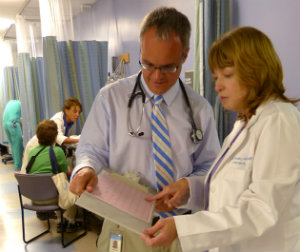 Drs. Jan Busby-Whitehead, right, and Kevin Biese lead a collaborative project at UNC-Chapel Hill that is improving care for older adults.
Drs. Jan Busby-Whitehead, right, and Kevin Biese lead a collaborative project at UNC-Chapel Hill that is improving care for older adults.Recently, I visited the University of North Carolina at Chapel Hill to see firsthand a collaborative project that has been developed over the past year by faculty in UNC’s Division of Geriatric Medicine and Department of Emergency Medicine and to meet with our colleagues at the William R. Kenan Jr. Charitable Trust.
The initiative’s leaders are Drs. Jan Busby-Whitehead, Chief of the Division of Geriatric Medicine, and Kevin Biese, an emergency medicine physician and geriatrics educator and researcher. They are working to develop a unique model of a geriatric emergency department (ED) focused on improving care transitions.
The question they are attempting to answer is: “Can a phone call after discharge from the ED improve health outcomes and reduce readmissions and repeat ED visits?” The initiative utilizes an established call triage service to contact patients after discharge from the ED.
Jan and her team have made inter-professional collaborations a cornerstone of their work because there are not nearly enough trained geriatricians to meet the demand. Her strategy has been not only to increase the size of her division’s geriatric medicine fellowship, but to reach out to multiple departments, centers, and schools across UNC to spread geriatric principles of care outside the walls of the UNC Center for Aging and Health and the Division of Geriatric Medicine.
One of her most important and longest collaborations has been with UNC’s Department of Emergency Medicine. With the support of its chair, Dr. Charles Cairns, she asked Kevin to work with her geriatrics team on an innovative, hospital-funded grant to improve care for older patients throughout the UNC Health Care System.
The result of this collaboration was an interprofessional research and care improvement team meeting weekly for more than six years, facilitated by Dr. Steve Kizer, the division’s vice chief. The group has published multiple peer-reviewed manuscripts, posted and presented a comprehensive educational curriculum for geriatric emergency medicine, launched an active joint geriatrics and emergency medicine fellowship, given numerous national presentations, and won two American Geriatrics Society presidential poster awards.
There are now five UNC emergency medicine physicians focused on geriatrics, working on systems of care, education of care providers, care transitions, and clinical research. Most importantly, they have worked together with UNC geriatricians to improve the care of older patients seen in UNC’s ED. A study published in Academic Emergency Medicine found that adding a geriatric curriculum to emergency medicine residency training may improve the knowledge base and decision-making of residents working with older adults, and may lower the risk of adverse outcomes for older patients.
The interprofessional research and care improvement team has received financial support from several John A. Hartford Foundation programs as well as from the Donald W. Reynolds Foundation and The Duke Endowment.
This new ED initiative is also a collaborative effort between foundations and is led by the Kenan Charitable Trust. The Trust, a substantial contributor to UNC, is primarily focused on improving education and making it accessible to all. The Trust’s Board and its executive director, Richard Krasno, saw this project as a cost-effective way to improve care in the ED and to collaborate with Hartford, which has funded UNC for many years as a Center of Excellence in Geriatric Medicine.
Dick and his leadership team at the Kenan Trust were enthusiastic about this work because it is innovative and collaborative and a practical way to dramatically increase the reach of geriatric knowledge and change the way the health care system functions.
The need for collaboration is manifest and increasingly recognized. We will not be able to meet the challenges of providing improved integrated care in a financially sustainable manner unless we reach across traditionally defined departmental barriers.
The impressive team Jan has assembled with Steve and Kevin is improving care for older adults in the ED, contributing to the knowledge base of geriatric emergency medicine, developing educational resources utilized nationally, and helping develop the next generation of leaders in geriatrics and geriatric emergency medicine.
Due to the innovative collaborative vision of a leading geriatrician—with help from the Kenan Trust and the Hartford and Reynolds Foundations and an energetic, multi-disciplinary team—the potential for further collaborations and a path forward to improving care for older adults is being established at UNC.
